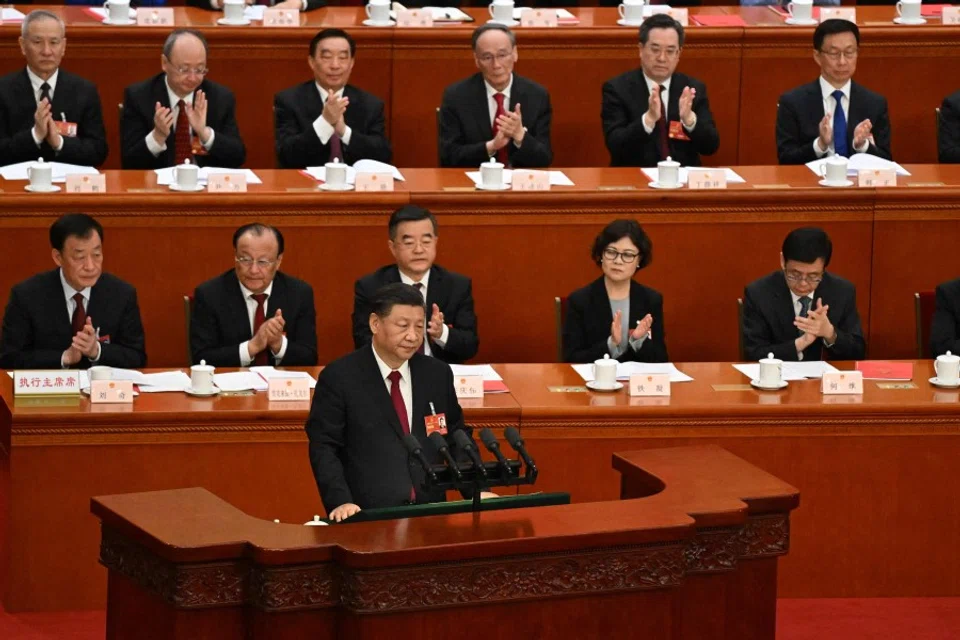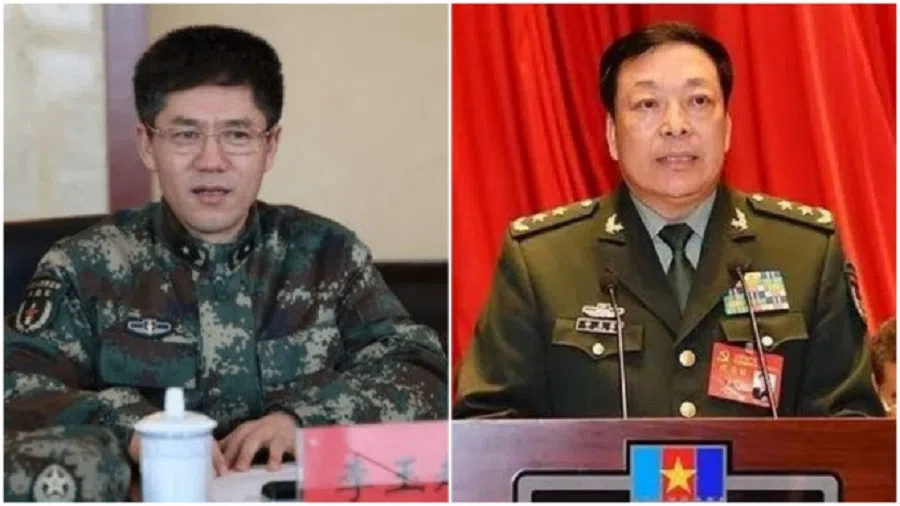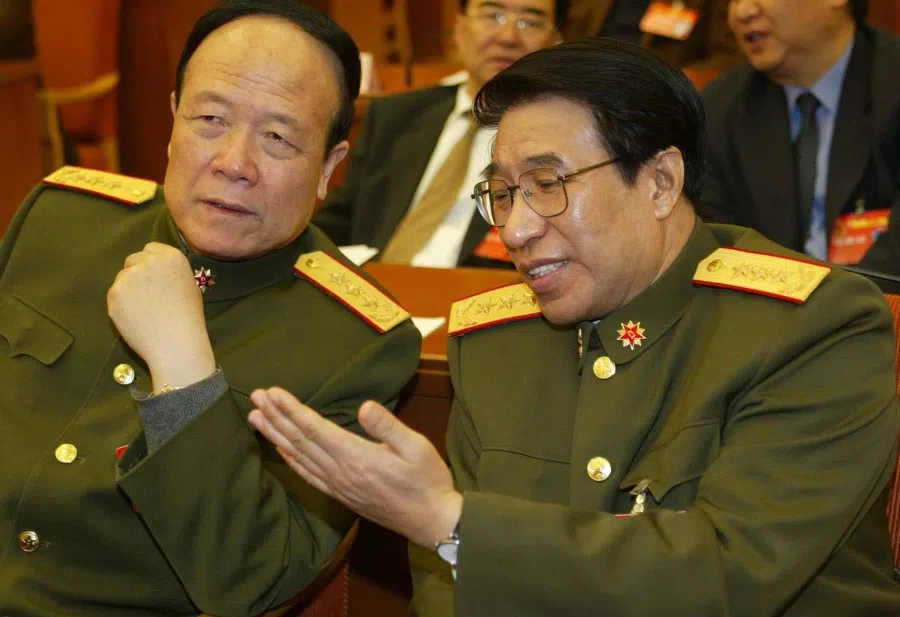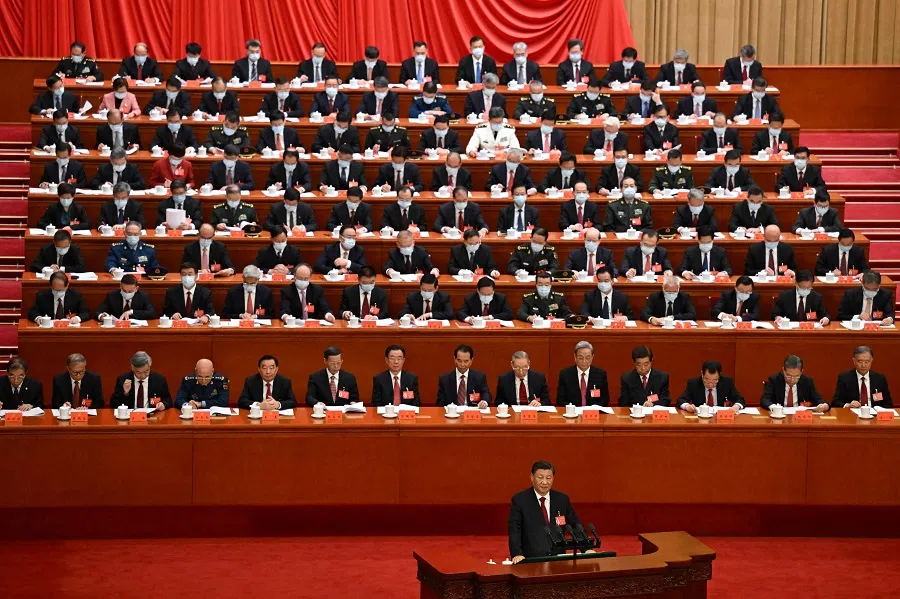[Big read] Long journey to purging military corruption in China
Former Chinese Defence Ministers Li Shangfu and Wei Fenghe were recently expelled from Communist Party and military, adding to the punishments of over ten military generals in the last year alone. Lianhe Zaobao correspondent Yu Zeyuan asks: why is it so challenging to curb corruption in the Chinese military?

In another high-level corruption saga within the Chinese military, former Chinese Defence Ministers Li Shangfu and Wei Fenghe were officially expelled from the Chinese Communist Party (CCP) and the military on 27 June. They have since been transferred to the military procuratorate for prosecution.
This follows the dismissal in 2014 and 2015 of Xu Caihou and Guo Boxiong, former members of the Politburo and former vice-chairmen of the Central Military Commission (CMC).
The general consensus is that since Xi Jinping became the CCP’s top leader in 2012, he has prioritised anti-corruption efforts to clean up his party and the army, and the People’s Liberation Army (PLA) has achieved significant anti-corruption outcomes and noticeably improved its discipline.
However, the removal of Li and Wei, as well as the investigation and punishment of more than ten PLA generals over the last year, including five full generals, underscore the persistent and entrenched nature of corruption within the PLA. This indicates that there is still a long way to go to fight corruption.
When every rank has a price
Following China’s reform and opening up in 1978, Deng Xiaoping urged the military to exercise patience and reduce spending to support the country’s economic development.
In the 1980s, some PLA units went into business to plug funding shortfalls. By the late 1990s, this was commonplace and seriously damaged the PLA’s combat effectiveness and discipline. Although top leaders ordered the military to stop doing business, corruption continued to be rife — just like the local governments — with the buying and selling of official positions openly practised.
“In the military, including the armed police and the PLA, one can pay to join the CPC, and for promotions to platoon-level, company-level, regiment-level, and division-level cadres. It’s so sad.” — Xu Caihou, Vice-Chairman, CMC, 2004-2012
Take the case of Xu Caihou, who served as CMC vice-chairman from 2004 to 2012. The military procuratorate accused him of using his position to help others get promoted, and accepting huge bribes, both directly and through his family.
The authorities did not disclose the amount of bribes Xu received, but Yang Chunchang, a major general at the PLA Academy of Military Science, told Phoenix TV in 2015 that a commander of a military region once gave Xu 20 million RMB (US$2.75 million). Yang said, “In the military, including the armed police and the PLA, one can pay to join the CPC, and for promotions to platoon-level, company-level, regiment-level, and division-level cadres. It’s so sad.”

In October 2014, at the Gutian Conference, Xi denounced corruption in the military. He said, “When I see materials reflecting these problems, I feel disgusted and often slam the table in anger. These problems have reached the point where they must be resolved! Otherwise, the military is in danger of deteriorating.”
From 2012 to 2017, the Chinese Communist Party (CCP) openly investigated and punished seven generals, including Xu Caihou, Guo Boxiong, Fang Fenghui, former chief of staff of the CMC Joint Staff Department, and Zhang Yang, former director of the CMC Political Work Department, as well as several dozens of senior officers at the general-level, in what was considered the most drastic anti-corruption campaign in the PLA’s history.
According to the authorities, as a high-ranking CCP and military official, Wei lost his faith and loyalty. His behaviour betrayed the trust of the CCP Central Committee and the CMC, and severely contaminated the political environment of the military.
Re-evaluating effectiveness of anti-corruption efforts
From the 19th National Congress in 2017 to the 20th National Congress in 2022, while the CCP maintained its zero-tolerance approach to corruption, the number of military leaders dismissed fell significantly, and cases of full generals who got into trouble were even rarer.
Some analysts believe that after the 18th National Congress, stricter enforcement, enhanced systems and increased educational efforts effectively curbed widespread corruption in the military. Hence, the number of senior generals investigated for corruption also decreased.
However, this viewpoint has been challenged by a number of high-level corruption cases in the military in 2023, especially those of Wei Fenghe and Li Shangfu, former defence ministers who were also CMC members and state councillors. Consequently, people are reevaluating the effectiveness of anti-corruption efforts in the Chinese military.

On 27 June, the Politburo reviewed and approved the CMC reports on the investigations and recommendations for Li and Wei. The Politburo decided to expel both from the party and the military, and ordered their transfer to the military procuratorate for prosecution.
Li accused of accepting and offering bribes
Li was accused of serious violations of party discipline, failing to do his part in upholding strict party discipline and resisting organisational reviews; serious violations of organisational discipline and seeking improper benefits in personnel arrangements for himself and others; taking advantage of his posts to seek benefits for others, and accepting a huge amount of money and valuables in return; and offering money to others to seek undue benefits, constituting the suspected crime of offering bribes. The investigation also revealed clues into Li’s other legal and disciplinary violations.
According to the communique, as a high-ranking CPC and military official, Li betrayed the party’s original aspirations and its principles. His actions betrayed the trust of the CPC Central Committee and the CMC, and severely sullied the political environment of the military equipment sector and the ethics of relevant industries, while hurting the party’s cause, the development of national defence and the armed forces, as well as the image of senior officials. His violations were also described as being extremely serious, highly detrimental and causing tremendous harm.
Wei accused of accepting bribes only but had held greater power
As for Li’s predecessor, Wei Fenghe, the authorities accused him of serious violations of party discipline, failing to do his part in upholding strict party discipline, and resisting organisational reviews; serious violations of organisational discipline and seeking improper benefits in personnel arrangements for others; serious violations of discipline regarding integrity, accepting money and gifts in violation of the relevant rules; and taking advantage of his posts to seek benefits for others in return for huge amounts of money and valuables, constituting the suspected crime of accepting bribes. The investigation also revealed clues into Wei’s other legal and disciplinary violations.
... both Li and Wei sought benefits for others in return for huge amounts of money and valuables, classic actions of corrupt officials. But the difference between the two is that in addition to taking bribes, Li also sought personnel benefits for himself through offering bribes.

According to the authorities, as a high-ranking CCP and military official, Wei lost his faith and loyalty. His behaviour betrayed the trust of the CCP Central Committee and the CMC, and severely contaminated the political environment of the military. His infringements caused enormous damage to the party’s cause, the development of national defence and the armed forces, as well as the image of senior officials. His violations were also described as being extremely serious, highly detrimental, and causing tremendous harm.
Corruption spreading like a disease
Based on the official announcements, both Li and Wei sought benefits for others in return for huge amounts of money and valuables, classic actions of corrupt officials. But the difference between the two is that in addition to taking bribes, Li also sought personnel benefits for himself through offering bribes. In other words, Li not only accepted money in exchange for official positions, but also gave money to higher-ups to buy official positions.
The authorities described Li’s actions as seriously contaminating the political environment of the military equipment sector and the ethics of relevant industries, indicating that he corrupted the ethics of his domain and the military industry during his tenure as the director of the CMC Equipment Development Department.
Their cases may be linked to Li’s case.
At the end of 2023, two deputy directors of the CMC Equipment Development Department, Lieutenant -General Zhang Yulin and Major-General Rao Wenmin, were removed from their positions as deputies to the National People’s Congress (NPC); Wu Yansheng, chairman of the China Aerospace Science and Technology Corporation, and Liu Shiquan, chairman of the Norinco Group, were among the heads of military industrial enterprises who were disqualified as members of the Chinese People’s Political Consultative Conference National Committee at the end of last year. Their cases may be linked to Li’s case.
On the other hand, Wei was accused of severely contaminating the political environment of the military, a wider scope than that of Li, because he served as a leader of the PLA Rocket Force for a long time. After the 19th National Congress in 2017, he was promoted to become a CMC member, state councillor, and defence minister. He served in this position for five years (Li was investigated within half a year in the position) and his influence in the military is also greater than that of Li.
No more trust: former Rocket Force leaders
In the first NPC Standing Committee bulletin of 2024 published on the NPC website, further details (including the job titles, reasons, and timing) of the cases involving the nine senior generals dismissed from their NPC deputy positions in late December of 2023 was disclosed. They were suspected of “serious disciplinary and legal violations”.
The nine are General Zhou Yaning and General Li Yuchao, successive commanders of the Rocket Force; General Ding Laihang, former commander of the Air Force, Lieutenant-General Li Chuanguang, former deputy commander of the Rocket Force; Lieutenant-General Zhang Zhenzhong, former deputy chief of staff of the CMC Joint Staff Department; Lieutenant-General Zhang Yulin, former deputy director of the CMC Equipment Development Department; Lieutenant-General Ju Xinchun, former deputy commander of the Southern Theatre Command and Southern Theatre Command naval commander; Major-General Lu Hong, former director of the Rocket Force Equipment Department; and Major-General Rao Wenmin, former deputy director of the CMC Equipment Development Department.
Rocket Force generals are no longer trusted by China’s top leaders, and need to be cleaned up.

Among them, generals from the Rocket Force formed the bulk of senior officials under investigation; Zhang Zhenzhong was a former deputy commander of the Rocket Force and deputy to Wei Fenghe.
On 31 July last year, the CMC held a ceremony to promote Rocket Force commander, Wang Houbin, and its political commissar, Xu Xisheng, to generals. This confirms that former Rocket Force commander, Li Yuchao, and former political commissar, Xu Zhongbo, had both been removed from their posts.
Last September, Li Tongjian, a Rocket Force major-general, lost his position as a Beijing Municipal People’s Congress representative for alleged serious disciplinary violations and work-related crimes.
The dismissal of former Rocket Force senior generals like Li Yuchao, Xu Zhongbo, Zhou Yaning, Zhang Zhenzhong, Li Chuanguang, Lu Hong, and Li Tongjian in one fell swoop, and the installation of naval officer, Wang Houbin, and air force officer, Xu Xisheng, as the new Rocket Force commander and political commissar respectively, point to a corrupt faction among its former leadership. Rocket Force generals are no longer trusted by China’s top leaders, and need to be cleaned up.
It is easy to see that most of the senior generals investigated since last year were once subordinates of Wei and Li, which is also why the authorities accused the two of “severely contaminating” the political environment of the military.
This shows that the military is still fertile ground for corruption, and it is far from being cleaned up.
Over ten generals dismissed in a year
In less than a year, over ten PLA generals have been removed, including five generals, four lieutenant-generals, and three major-generals, which is rare in the anti-corruption efforts of the Chinese military.
The cases of Li Shangfu and Wei Fenghe, as well as those involving the leadership faction of the Rocket Force and the CMC Equipment Development Department, show that although the top leaders of the CCP have prioritised anti-corruption efforts over the last decade and tried to curb corruption through tighter supervision and audits, corrupt practices such as the buying and selling of official positions, and bribe-taking are still commonplace in the military. This shows that the military is still fertile ground for corruption, and it is far from being cleaned up.
On the other hand, the investigations of Li and Wei show the determination of the CCP’s top leaders in maintaining zero tolerance for corruption.

Unlike generals like Xu Caihou and Guo Boxiong, who were groomed during Jiang Zemin’s era, Wei and Li were senior military officials promoted by Xi. However, once their legal and disciplinary violations were confirmed, the top leadership took firm action against them.
In fact, after the 20th National Congress, China’s top leader has absolute power over the selection of personnel for all important posts in the party, government, and military. There are no longer factional constraints as the fight against corruption only looks at the facts, regardless of factions.
However, in a society where bureaucratic dominance and entrenched privilege prevail, fully supervising the powers of senior officials is a daunting challenge.
Hard to eradicate corruption in the short term
Just like at the local government level, corruption in the military cannot be eradicated in the short term. In 2023, the Central Commission for Discipline Inspection investigated and punished 45 officials at the vice-minister level and above, the most since 2017. In the first half of this year, more than 30 officials at the vice-minister level and above have been investigated. This and the climax of anti-corruption efforts in the military show that the CCP has not eased up on its anti-corruption efforts.
In 2021, the CCP’s top leadership concluded that “an overwhelming victory has been achieved and fully consolidated in the fight against corruption”, and some people thought that the CCP might relax its anti-corruption efforts.
However, earlier this year, at the plenary session of the Central Commission for Discipline Inspection, Xi stressed, “In the face of a still grim and complex situation, there is no way for us to turn back, drop our guard, and show leniency in our fight against corruption, and we must continue our endeavours in this regard.”
Since 2023, a large number of high-ranking party, government, and military officials have been dismissed. This shows that corruption among officials is still an onerous problem. The country’s top leadership will not and dare not let down its guard, otherwise the CCP and the PLA would risk regressing.

On 17 June, at the CMC Political Work Conference in Yan’an, the revolutionary holy ground of the CCP, Xi said there must be no hiding place for corrupt elements in the army, and a steadfast commitment to strictness must be maintained rigorously to broaden the scope and intensity of the anti-corruption campaign.
At the same time, he called for the improvement of power allocation and checks and balances in the system; sought more tools for punishing new corruption types and covert corruption; and urged greater scrutiny of senior cadres in performing their duties and exercising their powers.
However, in a society where bureaucratic dominance and entrenched privilege prevail, fully supervising the powers of senior officials is a daunting challenge. China’s officialdom has a long history of corruption, and such an environment cannot be cleansed in a matter of years or even decades, and the military is no exception.
Even if its top leadership has taken down “big tigers” in the military such as Xu Caihou, Guo Boxiong, Fang Fenghui, Zhang Yang, Wei Fenghe, and Li Shangfu, the Chinese military still has a long way to go in its anti-corruption campaign.
This article was first published in Lianhe Zaobao as “腐败劣根摘不尽 中国整肃军队路漫漫“.





